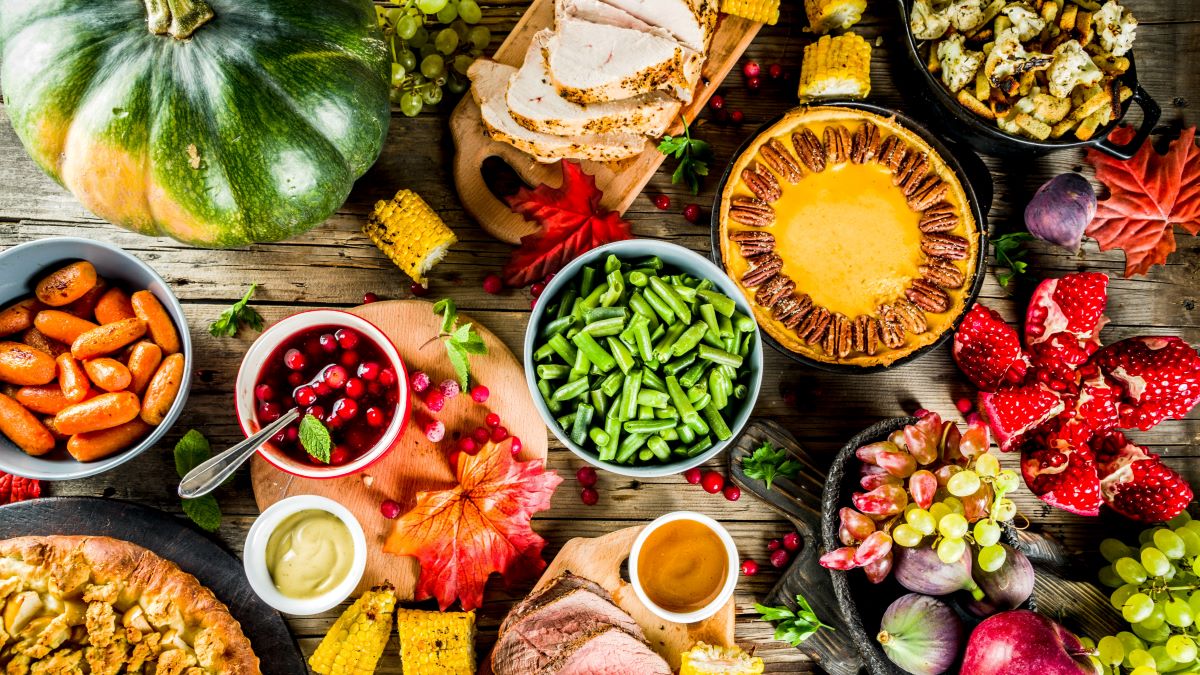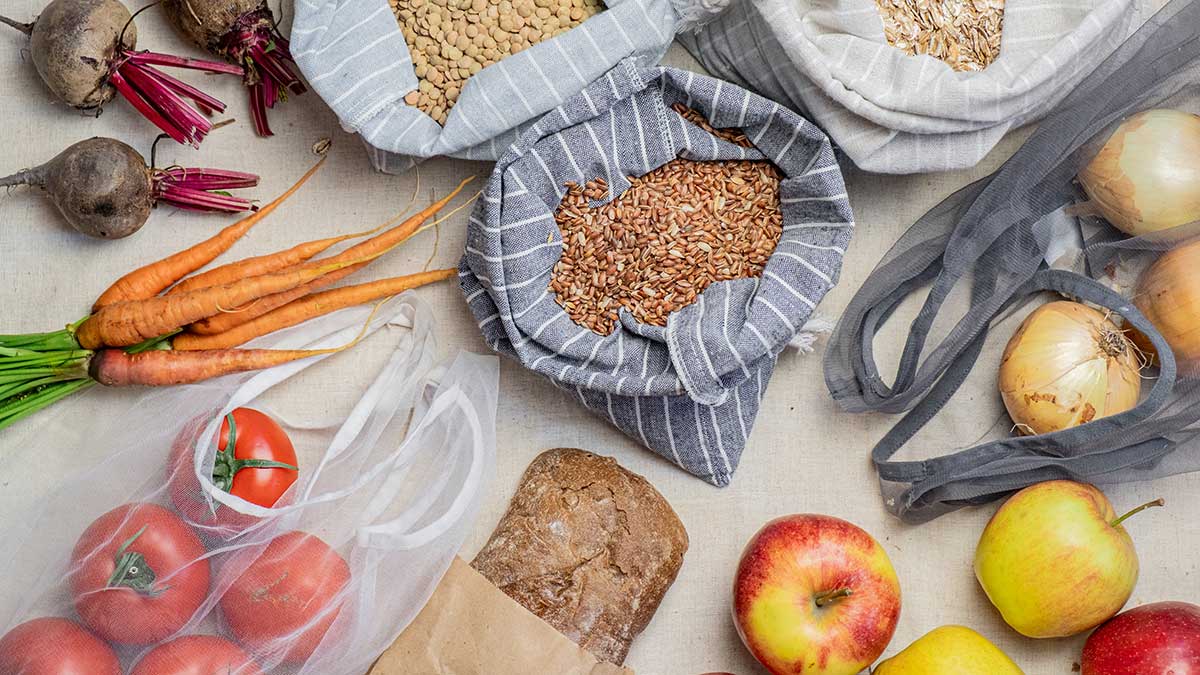Thanksgiving is just around the corner, and for many, this day symbolizes guilt-free gluttony. While merriment and raising a sustainable toast are more than encouraged, here are some simple swaps that will keep the pounds (and chemicals) off, while promoting animal welfare and a healthier, happier planet.
1. Turkey
GREEN THIS: Turkeys labeled USDA Organic meet specific requirements of organic farming. Turkeys carrying this label may not receive antibiotics, arsenic compounds, or animal byproducts, and must eat 100% organic feed. The animals must have access to the outdoors or pasture, and GMOs are prohibited. You do have a choice when shopping, so why not buy a turkey that was raised as healthy food, not an industrial product? Purchase an organic turkey from a local farm or farmers’ market and familiarize yourself with these labels:
Good: “Pasture Raised” is not a regulated certification, but it may indicate that these turkeys were raised on pasture rather than indoors.
Better: The “Certified Humane” registered trademark indicates the turkey was treated humanely. Animals are not confined to cages or crates, poultry is not de-beaked, and animals endure minimal suffering before slaughter. Antibiotics are used only to treat sickness as prescribed by a vet. But these animals do not necessarily have access to pasture.
Best: “Animal Welfare Approved” certification is granted by A Greener World to independently owned family farms that raise their animals outdoors on pasture, allowing them to perform their natural and instinctive behaviors. This label indicates:
- Continuous outdoor area that is covered with growing vegetation, and at least 4 square feet per bird
- Beak cutting and forced molting, the latter involving starving the birds, are not allowed
- Animals’ diets cannot contain meat or animal byproducts
- No growth hormones are allowed, and animals must be insensible to pain before slaughter
- Animals being raised for meat can be given antibiotics only by a vet treating sickness, and antibiotics must be cleared from the animal’s system prior to slaughter
NOT THIS: Are you paying more for turkeys labeled “hormone-free?” Save your dollars, because no poultry in the U.S. is allowed to receive hormones. So they are all hormone-free (can you say greenwashing?). Turkeys labeled “natural,” “pastured,” and “conventional meat” do not meet the same standards or undergo the same inspections as USDA Organic.
- Avoid: “Free-range” — although the government regulates this term and requires that turkeys have access to the outdoors, the area may be quite small. The frequency and duration of access aren’t specified. No on-site review of operation is performed before issuing this label, and painful surgical procedures without pain meds are permitted.
Or, skip the turkey: Turkeys on factory farms are deprived of the simplest of pleasures, like running, building nests, spreading their wings, and raising their young. Even worse, they are killed when they are only 5 or 6 months old. After their beaks and toes are burned off with a hot blade, they are crammed into grimy sheds. If you can’t verify the source, opt for a non-GMO, vegetarian, or vegan alternative.
Also, you can order a free Vegan Starter Kit from PETA. Just fill out the form to request a free copy. It is packed with recipes and tips for making the switch to vegan.
2. Cookware
GREEN THIS: Avoid nonstick cookware. Use cast iron, food-grade stainless steel, or ceramic cookware, and glass, earthenware, or cast iron for baking to avoid exposure to aluminum and perfluorochemicals (PFCs). PFAS (per- and polyfluoroalkyl substances) are the modern concern, often called “forever chemicals” because they don’t break down in the environment.
NOT THIS: Did you know that PFCs (PFOA and PTFE) are used in the manufacturing of nonstick cookware, such as the Teflon brand? These coatings begin to break down and release toxins into the air at a temperature of only 446 degrees Fahrenheit. They are a likely carcinogen, as they have been shown to cause cancer in animal studies. For more information on PFAS exposure, visit the CDC’s PFAS webpage.
3. Bread
GREEN THIS: Eat the correct type of carbohydrates; buy 100% whole grain and 100% whole wheat. A “good carb” contains “whole-grain” or “stone-ground” flour. Don’t look for this in the large print on the package, as they can stretch the truth here. Look for these words near the top of the ingredient list. Whole-grain and stone-ground flours contain the entire grain kernel, hence more nutrients. Also, choose USDA Organic and Non-GMO Project Verified items.
NOT THIS: Remember that just “wheat flour” and “unbleached wheat flour” do not contain the whole grain. Also, avoid the word “enriched.” It sounds nice, but it’s not! Enriched means they stripped the grain of everything good and healthy, including fiber and B vitamins, then attempted to add the vitamins back in, but in a form that’s inferior and not as well absorbed by the body.

4. Vegetables and Fruits
GREEN THIS: Choose USDA Organic produce with a 5-digit PLU (Price Look Up) code starting with #9 and Non-GMO Project Verified. (A 4-digit PLU number indicates pesticides.) Avoid genetically modified foods. High-risk GMO crops include soy, corn, alfalfa, and canola.
If your budget is tight, stick with conventionally grown produce on the Environmental Working Group’s Clean Fifteen list. These produce categories have been found to have the lowest levels of pesticide residues. The Clean Fifteen list for 2025 includes pineapples, sweet corn, avocados, papaya, onions, sweet peas (frozen), asparagus, cabbage, watermelon, cauliflower, bananas, mangoes, carrots, mushrooms, and kiwi.
NOT THIS: Avoid the EWG’s Dirty Dozen list of produce (fruits and veggies found with the highest levels of pesticide residue), or purchase only organic produce. The 2025 Dirty Dozen list includes strawberries, spinach, kale/collard/mustard greens, grapes, peaches, cherries, nectarines, pears, apples, blackberries, blueberries, and potatoes.

5. Dairy Products
GREEN THIS: Choose organic dairy products from grass-fed cows. Look for labels that say “100% Grass-Fed,” “Pasture-Raised,” or carry the American Grassfed Association certification. Organic dairy products come from milke produced by cows that have not been treated with synthetic hormones like rBGH or rBST, and have not been given antibiotics. Grass-fed dairy is higher in beneficial omega-3 fatty acids and conjugated linoleic acid (CLA).
Better option: Try plant-based alternatives like oat milk, almond milk, or cashew cream for your mashed potatoes and desserts. Many plant-based options now have excellent texture and taste while being more sustainable and allergy-friendly.
NOT THIS: Conventional dairy from factory farms where cows are confined indoors, given growth hormones, and fed GMO corn and soy instead of their natural diet of grass. These products may contain residues of hormones and antibiotics, and support unsustainable farming practices.
6. Cranberry Sauce
GREEN THIS: Make your own cranberry sauce from scratch using organic fresh or frozen cranberries, organic sugar or maple syrup, and organic orange zest. It takes just 15 minutes, and you know exactly what goes in. Fresh cranberries are naturally high in antioxidants and vitamin C.
Even better: Use organic cranberries with natural sweeteners like maple syrup, honey, or coconut sugar. Add warming spices like cinnamon, ginger, and cloves for extra flavor and health benefits without refined sugar.
NOT THIS: Canned cranberry sauce typically contains high-fructose corn syrup, artificial colors, and preservatives. Many brands also use conventionally grown cranberries that may carry pesticide residues.
7. Stuffing/Dressing
GREEN THIS: Make stuffing from scratch using organic whole grain bread, organic vegetables (celery, onions, carrots), organic herbs, and organic broth. You can add nutritious ingredients like mushrooms, chestnuts, dried fruits, and nuts for extra flavor and nutrition (we love a pistachio-apricot stuffing).
Healthy twist: Try alternative grains like quinoa, wild rice, or farro mixed with roasted vegetables, fresh herbs, and toasted nuts for a nutrient-dense side dish.
NOT THIS: Boxed stuffing mixes often contain MSG, artificial flavors, excessive sodium, hydrogenated oils, and preservatives. They’re also typically made with refined white bread that offers minimal nutritional value.
8. Gravy
GREEN THIS: Make homemade gravy using the natural pan drippings from your organic, pasture-raised turkey, organic vegetables for the base, and organic flour or cornstarch for thickening. Scratch recipes give you complete control over the ingredients and sodium content.
Alternative option: Use vegetable-based gravies made with mushrooms, onions, and nutritional yeast for a rich, savory flavor that’s plant-based and equally delicious.
NOT THIS: Jarred or packet gravies loaded with MSG, artificial flavors, excessive sodium (some contain over 400mg per serving), and often contain trans fats and artificial colors. Many also use conventional animal products from factory farms.
9. Sweet Potato Casserole
GREEN THIS: Choose organic sweet potatoes and skip the marshmallow topping, which is laden with corn syrup and artificial colors. Instead, roast sweet potatoes with a touch of organic butter or coconut oil, a sprinkle of cinnamon, and a drizzle of pure maple syrup. Top with organic pecans for crunch.
Naturally sweet: Sweet potatoes are already naturally sweet and packed with vitamins A and C, fiber, and antioxidants. They don’t need to add sugar. Try roasting sweet potatoes with savory herbs like rosemary and thyme instead of sugar.
NOT THIS: The traditional sweet potato casserole with canned yams (often sweetened with corn syrup), topped with marshmallows made from high-fructose corn syrup, artificial colors, and gelatin, creating a dessert-like dish loaded with refined sugar.
10. Disposable Tableware
GREEN THIS: Use real plates, glasses, and cloth napkins. If you must use disposables, choose compostable options made from bamboo, palm leaves, or sugarcane (bagasse). Look for certifications like BPI (Biodegradable Products Institute) or CMA (Compost Manufacturing Alliance) to ensure they’re truly compostable.
Bonus tip: Cloth napkins are reusable year after year, reduce waste, and add elegance to your table. They’re easy to wash and will save you money over time.
NOT THIS: Disposable plastic or Styrofoam plates, cups, and plastic utensils that will sit in landfills for hundreds of years. Even paper plates often have a plastic coating that prevents them from being composted or recycled.
11. Food Storage
GREEN THIS: Store leftovers in glass containers with silicone or stainless steel lids. Glass is non-toxic, doesn’t absorb odors or stains, and can go from fridge to oven. Beeswax wraps are excellent alternatives to plastic wrap for covering dishes.
Sustainable option: Use reusable silicone food storage bags instead of single-use plastic bags. They’re dishwasher- and freezer-safe and will last for years.
NOT THIS: Single-use plastic wrap, aluminum foil (which requires significant energy to produce), and plastic storage containers that may leach chemicals like BPA and phthalates into your food, especially when heated.
12. Cleaning Products
GREEN THIS: Use natural cleaning products or make your own with simple ingredients like vinegar, baking soda, castile soap, and essential oils for effective, non-toxic, and safe solutions for your family and the environment. Look for products certified by Green Seal, EPA Safer Choice, or EWG Verified.
DIY option: A simple mixture of equal parts water and white vinegar works for most kitchen cleaning tasks. Add lemon essential oil for a fresh scent and extra grease-cutting power.
NOT THIS: Conventional cleaning products containing harsh chemicals, synthetic fragrances, chlorine bleach, ammonia, and antibacterial agents like triclosan that can disrupt hormones, irritate skin and lungs, and contribute to antibiotic resistance.
Editor’s Note: Originally published on November 11, 2015, this article was significantly updated in November 2025.
Source link
Lisa Beres earth911.com



